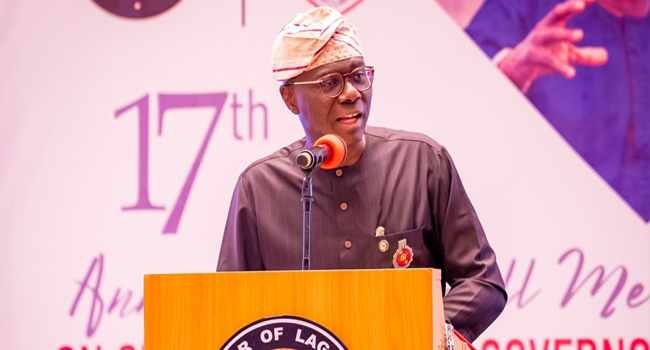Lagos State Governor, Mr Babajide Sanwo-Olu, said that the need to create sustainable economic opportunities for the swelling population of young people in the state has restructured his administration’s intervention in the job creation sector.
Governor Sanwo-Olu made this assertion while speaking at the third Employment Summit organised by the Lagos State Employment Trust Fund (LSETF) themed: “Job Creation – Uniting for Impact: Create, Collaborate Change,” held at the Eko Hotels and Suites, Victoria Island.
The governor said the new drive was doubling the state’s investment in skill development and entrepreneurship to generate more job opportunities and raise productivity, expressing the belief that the trend of uncontrolled migration of young people to the city required adequate resource allocation to create employment opportunities for the growing demographic, leveraging entrepreneurship and skill acquisition programmes.
He said, to this end, the state had been repurposing its intervention to empower young people with viable skills and support Micro, Small and Medium Enterprises (MSMEs) for expansion to create job opportunities for unemployed people.
Governor Sanwo-Olu assured that his administration was ready to double the financial support given to entrepreneurs and MSMEs to get twice the results of what the state government was currently getting, saying that the state equally expected “our partners on this project to also consider doubling their support towards meeting the goals.”
“As a Government, we have activated a model that will enable us create a resilient environment where we can continuously roll out interventions that will catalyse job creation and entrepreneurial activities.
“Between 2035 and 2050, the number of youths in the employment bracket will grow rapidly and we need to plan for them from today. The statistics are real. We need to be able to ensure we can create opportunities that will make life meaningful for them at the time.
“It is only when we collaborate and work with LSETF to equip able young men with modern skills to get jobs that will meet today’s demands and also be useful in the future.
“The state government is ready to double the financial support given to entrepreneurs and MSMEs to get twice the results of what we are currently getting. We will expect our partners on this project to also consider doubling their support towards meeting the goals,” he said.
Speaking further, Sanwo-Olu said LSETF had stabilised its operations and scaled up performance over the last eight years, but stressed that the agency must focus on job data gathering and analysis to have reliable employment data that would help the state and partners allocate their investment.
According to him, the data will be useful to properly understand the trend of work and skills required to meet today’s needs and prepare for the future.
“Lagos has made significant strides in improving the employment landscape. Our unemployment rate has seen significant positive change, thanks to various initiatives and policies aimed at creating jobs and empowering our youth. As we move forward, it is imperative that we continue to unite our efforts.
“I call on all stakeholders, including government agencies, the private sector, civil society and international partners, to join hands with us in this mission. Together, we can create more opportunities, foster greater collaboration, and drive the transformative change that Lagos needs,” the governor said.
Acting LSETF Executive Secretary, Mrs Feyisayo Alayande, said Lagos had continued to respond proactively to the dynamic challenges of unemployment and unemployability, pointing out that the agency’s financial support for small businesses had resulted in the creation of 221,172 direct and indirect employment.
Alayande added that LSETF’s interventions had saved 204,000 direct jobs, while impacting over 500,000 businesses through loan support to MSMEs, stating that the agency, through partnerships with USADF, UNDP and GIZ, has also trained 18,998 youths in Lagos in various sectors.
According to her, the sectors include creative, hospitality, construction, renewable energy, services, and business support, disclosing that 65 per cent of the beneficiaries had been successfully placed on jobs and further added to the new tax-payer brackets of the state.
“Through partnerships with USADF, UNDP and GIZ, we have also trained 18,998 youths in Lagos in various sectors, including creative, hospitality, construction, renewable energy, services, and business support; 65 per cent of the beneficiaries have been successfully placed on jobs and further added to the new tax-payer brackets of the state,” Alayande said.
The State Commissioner for Wealth Creation and Employment, Hon. Akinyemi Ajigbotafe, said the event’s team spoke to the collective responsibility required to bring change in the employment market.
Ajigbotafe said the government could not alone bear the burden of creating jobs and employment opportunities for the unemployed, stressing that the action required partnership with the private sector.
LSETF Board Chairperson, Mrs Bola Akinsola, in her own remark, said the demand for gainful employment was now more pressing than ever, stressing that the collaborative approach adopted by the agency was imperative to sustain job creation.
“As Lagos economy evolves, so also is the aspiration of the youth craving for decent employment. The demand for gainful employment is more pressing now than ever before.
“We need to create more jobs faster than the demand for them. As stakeholders, it is incumbent on us to forge a unified path towards a prosperous future,” Adesola said.
Chairman of FATE Foundation, Mr Fola Adeola, who delivered the keynote speech, said the large youth demographic in the country should be a growth dividend for Lagos, stressing that the population of unemployed youths may continue to be a burden on the country if there was no strategic action taken to create job opportunities for them.
The high point of the event was the launch of the Labour Market Information System by Governor Sanwo-Olu aimed at providing up-to-date information to individuals and institutions seeking data about employment within the state.
